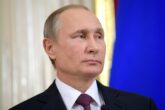April 26, 2021
Why Berlin And Washington Should Compromise On Nord Stream 2
After four years of chaos in US-EU relations, it was as if the clouds immediately parted on 3 November 2020. Transatlanticists in Washington and across Europe breathed a sigh of relief as Americans voted for a president who is both pro-EU and pro-NATO. The work of repairing a damaged transatlantic relationship could finally begin. Unfortunately, that honeymoon period may be coming to an abrupt halt. Progress on several pressing transatlantic issues in the next four years will depend on deep coordination and healthy relations between the United States and Germany. That bilateral relationship is on thin ice. At the top of the list of irritants is the Nord Stream 2 pipeline in the Baltic Sea, which is around 95 per cent complete and is set to provide Russian natural gas to the European market.
Progress on several pressing transatlantic issues in the next four years will depend on deep coordination and healthy relations between the United States and Germany. That bilateral relationship is on thin ice.
To an outside observer, a pipeline project years in the making might not seem like it has the ability to derail the US-European partnership. That assumption is wrong; this single initiative is a proxy for a whole spectrum of US concerns about Europe. This is why successive US administrations have strongly opposed it. American policymakers fret about growing Russian influence across Europe, the potential for Ukraine to lose billions in annual revenue from transit fees if Russia tries to bypass its natural gas infrastructure, and the reality that Washington may have less say on European policy as the continent becomes more independent-minded. They are also aware that, as ECFR’s latest EU Coalition Explorer shows, Germany is the key country among the EU27 when it comes to European cooperation on transatlantic relations and energy policy.
Germans, for their part, see Nord Stream 2 as strengthening European energy security, and believe that US hawkishness on Russia is counterproductive. In the long run, they view clear-eyed and cautious engagement with Moscow as the smarter play.
Read the full article from the European Council on Foreign Relations.
More from CNAS
-
Trump ‘Humiliated’ as Putin Sends Clear Message That He Doesn’t Care About US
"Putin is not playing ball." Putin's Palm Sunday attack on Sumy is "embarrassing for the White House" as it comes just days after Steve Witkoff met with the Kremlin, says adju...
By Jim Townsend
-
The Hidden Past and Uncertain Future of the U.S. and Ukraine with Celeste Wallander
Under the Trump administration, U.S. support for Ukraine is no longer guaranteed. President Trump's pause on aid and intelligence to Ukraine in March may have been brief, but ...
By Andrea Kendall-Taylor, Jim Townsend & Celeste Wallander
-
Is Russia Under Pressure?
Since 2014, the United States and its allies have provided increasing military support to Ukraine while imposing more and tougher economic sanctions on Russia, especially sinc...
By Jeffrey Edmonds
-
Europe's Trade War Woes
On April 2nd, President Trump imposed sweeping tariffs across the globe – with only a handful of countries left untouched. The EU was hit with tariffs of 20% and the European ...
By Andrea Kendall-Taylor & Jim Townsend



